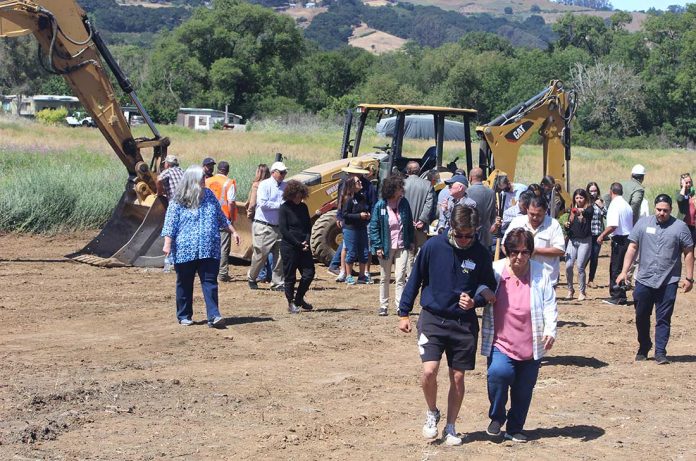
San Benito County officials declined to stop contractors from working on the Betabel Road development off Highway 101, despite a recent demand from the Amah Mutsun Tribal Band.
On Aug. 17, attorney Sara A. Clark of the Shute, Mihaly and Weinberger law firm, sent a letter to the county on behalf of Amah Mutsun members demanding the county stop work on the project located near the intersection of Betabel Road and Highway 101. The letter states that the county “violated a number of its own laws and policies” when it approved permits for the project.
These alleged violations include a failure to consult with Native American tribes before approving permits, and a failure to conduct archeological studies as required by the San Benito County General Plan.
The property that is the site of a 29-acre agricultural and commercial development is within the Amah Mutsun Tribe’s sacred ancestral lands known as Juristac, according to Clark’s letter.
“Despite the clear legal mandate to undergo government-to-government consultation with California Native American Tribes, the county has completely ignored its responsibilities to consult with the Amah Mutsun regarding the project,” says Clark’s letter. “This consultation should have provided a forum for the Amah Mutsun to express its objection to the project’s location and concern about potential cultural resource impacts. Yet, the Amah Mutsun never received this opportunity.”
But the portion of the project that is currently under construction—a farm stand and mercantile building—does not require consultation with native tribes or archeological surveys under county codes, says an Aug. 23 letter from Assistant County Counsel Joel Ellinwood to Clark. Because the farm stand and related structure is agricultural on a property that is zoned agricultural, approval of the building permit was “ministerial,” and not subject to tribal consultation under county planning guidelines, Ellinwood’s letter states.
Ellinwood’s Aug. 23 letter says the county will not require the developer to stop work on the permitted work that is underway at the Betabel Road site.
However, future development of the site is likely to require tribal consultation under state environmental laws, Ellinwood wrote in the Aug. 23 letter.
The property in question is located along Highway 101 off the Betabel Road exit in San Juan Bautista. Property owner the McDowell Charity Trust has proposed a 29-acre commercial development inspired by a 1950s-era California roadside stop, with a wooden barn housing a produce stand, a service station and a vintage motel. A visitors’ center would be built in the shape of a watering can, meant to introduce travelers to San Benito County and promote its destinations.
Rider and Victoria McDowell created the McDowell Charity Trust after their son, Errol Cross McDowell, died of pediatric brain cancer in 2018 at the age of 18. The McDowells have pledged all profits from the Betabel Project to go toward pediatric cancer research.
Herman Garcia, spokesperson for the McDowell Charity Trust, said the proposal for the larger commercial facilities—gas station, hotel and visitors’ center—will be subject to an environmental study before construction starts.
The 29-acre proposal covers about 20 percent of the property owned by the McDowell Charity Trust. The rest of the property will be preserved as agriculture and open space, Garcia added.
Ellinwood’s letter added, “if and when” the developer submits an application for permits for the rest of the Betabel site, “tribal consultation as required under CEQA will be initiated, as well as the appropriate level of CEQA review, which more than likely will include the preparation of an Environmental Impact Report.”
CEQA is the California Environmental Quality Act, a state law that requires certain construction projects to assess their impact on the environment and identify mitigation measures before building.
“The County of San Benito recognizes the cultural sensitivity of the area in question at the confluence of the San Benito and Pajaro Rivers for California Native American Tribes, and for the Amah Mutsun Tribal Band in particular,” Ellinwood’s letter says. “The county will engage in good faith consultation, including the project proponent or its consultants if appropriate, regarding proposals capable of avoiding or substantially lessening potential significant impacts to a cultural resource or that would avoid such impacts.”
Valentin Lopez, chair of the Amah Mutsun Tribal Band, said the tribe sees the county’s land use and General Plan guidelines as “flawed and inadequate” if they allow construction of even a farm stand on sacred tribal land. He is seeking further advice from the tribe’s attorneys to determine their next option for stopping the Betabel Road development.
The Amah Mutsun Tribe has long advocated for preservation of the vast swath of Central Coast hillsides known as Juristac, which lies in portions of San Benito, Santa Clara and Santa Cruz counties.
“Betavel (also known as Betabel and/or Bitabel) Bluffs is one of the four villages that comprise the Juristac landscape. The site is well known for its connection to Noyola, who encountered the Mutsun Evil Spirit in this area and was put through several tests,” Clark’s letter says. “It was also an important traditional plant collecting area for the Tribe, including Ascension Solorasano (the noted Mutsun tribal healer) in the late 1800s and early 1900s. For these reasons, the Amah Mutsun continue to have an emotional and spiritual association with Betabel, which has been shared directly with county staff.”
Lopez said if the Amah Mutsun were to regain control of the Juristac lands, the tribe would aim to preserve the property and wildlife as a natural and cultural resource.
“Our goal is to somehow be able to conserve and protect that property, turn it into a tribal park so our people can steward it and manage it in the way that our ancestors did,” Lopez said. “We would want to restore the native plants, take care of the riparian springs, the creeks (and) restore the wildlife that was there.”









